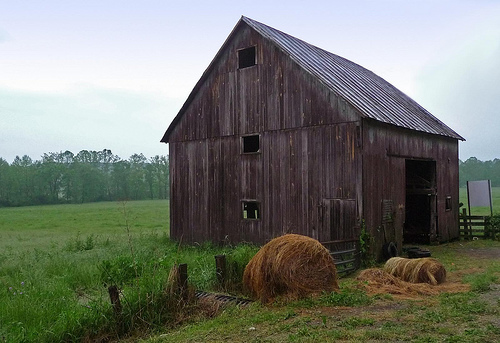
Last Monday, Wendell Berry , widely known as today’s quotable agriprophet, America’s modern man of letters, was given the prestigious honor of presenting the Jefferson Lecture, the nation’s highest prize for “distinguished intellectual achievement.” What he spoke of–beyond his grandfather’s h0meland loyalty and the tragic industrial legacy of James B. Duke, for whom Duke University is named–was an ethic of affection, a turning way from the Diaspora of Modern Mobility–our privatized and lonesome Babylon–a repentance and return to a culture of sympathetic humility to one’s own. Berry’s essay was titled “It All Turns on Affection.”
, widely known as today’s quotable agriprophet, America’s modern man of letters, was given the prestigious honor of presenting the Jefferson Lecture, the nation’s highest prize for “distinguished intellectual achievement.” What he spoke of–beyond his grandfather’s h0meland loyalty and the tragic industrial legacy of James B. Duke, for whom Duke University is named–was an ethic of affection, a turning way from the Diaspora of Modern Mobility–our privatized and lonesome Babylon–a repentance and return to a culture of sympathetic humility to one’s own. Berry’s essay was titled “It All Turns on Affection.”
I am from Kentucky, my family has lived in Kentucky for generations, and so Berry’s recollections inspire some acute homesickness. For some this pointing back is a liberating and communal call to action, and for others it could be argued that Berry’s grandfather-talk is pure nostalgia, naivete. (In fact, a portion of Wendell’s speech documents the only “longest trip” his grandfather ever took, before his death, from his hometown in Kentucky to the wild land of…Tennessee.) Nostalgia is a shallow misnomer, though, and Wendell Berry’s work has never been to evoke a remembered time solely to remember it–it would be like saying a prophet speaks solely to render time passed. Instead, Berry is an emissary of the hopeful human, and his epistles evoke what “minor theme” has been and is still there. This minor theme–in tribute to teacher and mentor Wallace Stegner–turned on the quiet discord of “stickers” to “boomers”.
He thought rightly that we Americans, by inclination at least, have been divided into two kinds: “boomers” and “stickers.” Boomers, he said, are “those who pillage and run,” who want “to make a killing and end up on Easy Street,” whereas stickers are “those who settle, and love the life they have made and the place they have made it in.” “Boomer” names a kind of person and a kind of ambition that is the major theme, so far, of the history of the European races in our country. “Sticker” names a kind of person and also a desire that is, so far, a minor theme of that history, but a theme persistent enough to remain significant and to offer, still, a significant hope.
The boomer is motivated by greed, the desire for money, property, and therefore power. James B. Duke was a boomer, if we can extend the definition to include pillage in absentia. He went, or sent, wherever the getting was good, and he got as much as he could take.
Stickers on the contrary are motivated by affection, by such love for a place and its life that they want to preserve it and remain in it. Of my grandfather I need to say only that he shared in the virtues and the faults of his kind and time, one of his virtues being that he was a sticker. He belonged to a family who had come to Kentucky from Virginia, and who intended to go no farther. He was the third in his paternal line to live in the neighborhood of our little town of Port Royal, and he was the second to own the farm where he was born in 1864 and where he died in 1946.
Where a “boomer” is the affiliate to control, to production, to ambition and mobility, the “sticker” stays and plays by the rules of the minor theme. The “sticker” is overwrought by the industrialist and stays on his land–the “sticker” sees difficulty as life’s precondition and abides and does not seek escape. In a world of “boomers,” of which we are a part, of whose systems we sup and slave, the slow, small affection of the “sticker” remains with the churning heart of the modern man. Because the “boomer” belongs everywhere, he is nowhere; the “sticker,” like a mustard seed, invisible, underground, produces the mountain-moving force of a silent sermon.
Berry describes the pandemic of modern mobility as a farmer with stories to tell, but it is translatable to the various mobilities we have pointed out on Mockingbird. Whether it’s Facebook, or Amazon, or Mad Men, the modern man is a ladder-climbing character, conflicted in the success he attains (or does not attain) and the distance it brings to those he most cherishes. Modern mobility, for Berry, is modern distancing–and the only way it gets any better is if the ladder is descended once again, in the name of abiding love and compassion.
And so it has seemed to me less a choice than a necessity to oppose the boomer enterprise with its false standards and its incomplete accounting, and to espouse the cause of stable, restorative, locally adapted economies of mostly family-sized farms, ranches, shops, and trades. Naïve as it may sound now, within the context of our present faith in science, finance, and technology—the faith equally of “conservatives” and “liberals”—this cause nevertheless has an authentic source in the sticker’s hope to abide in and to live from some chosen and cherished small place—which, of course, is the agrarian vision that Thomas Jefferson spoke for, a sometimes honored human theme, minor and even fugitive, but continuous from ancient times until now. Allegiance to it, however, is not a conclusion but the beginning of thought.
The problem that ought to concern us first is the fairly recent dismantling of our old understanding and acceptance of human limits. For a long time we knew that we were not, and could never be, “as gods.” We knew, or retained the capacity to learn, that our intelligence could get us into trouble that it could not get us out of. We were intelligent enough to know that our intelligence, like our world, is limited. We seem to have known and feared the possibility of irreparable damage. But beginning in science and engineering, and continuing, by imitation, into other disciplines, we have progressed to the belief that humans are intelligent enough, or soon will be, to transcend all limits and to forestall or correct all bad results of the misuse of intelligence. Upon this belief rests the further belief that we can have “economic growth” without limit.
…That we live now in an economy that is not sustainable is not the fault only of a few mongers of power and heavy equipment. We all are implicated. We all, in the course of our daily economic life, consent to it, whether or not we approve of it. This is because of the increasing abstraction and unconsciousness of our connection to our economic sources in the land, the land-communities, and the land-use economies. In my region and within my memory, for example, human life has become less creaturely and more engineered, less familiar and more remote from local places, pleasures, and associations. Our knowledge, in short, has become increasingly statistical.
Berry is quite plain that truth will out. As a Nathan rebuking a David, “You are the man!” Berry points the blame inward. Our lives abstracted, exchanging the economy of household for the global economy, our indictment and hanging will come despite our efforts to run from it. As wide-spanning as he is about our own culpability, Berry is also quite plain about modern man’s incapacity to absolve ourselves. It must, must, come from without. It must not be motivated by the greed of moralism but instead the downward-driving sorrow of affection. If it will ever work, God must make stick.
I don’t hesitate to say that damage or destruction of the land-community is morally wrong, just as Leopold did not hesitate to say so when he was composing his essay, “The Land Ethic,” in 1947.
But I do not believe, as I think Leopold did not, that morality, even religious morality, is an adequate motive for good care of the land-community. The primary motive for good care and good use is always going to be affection, because affection involves us entirely. And here Leopold himself set the example. In 1935 he bought an exhausted Wisconsin farm and, with his family, began its restoration. To do this was morally right, of course, but the motive was affection. Leopold was an ecologist. He felt, we may be sure, an informed sorrow for the place in its ruin. He imagined it as it had been, as it was, and as it might be. And a profound, delighted affection radiates from every sentence he wrote about it.
…My grandparents were fortunate. They survived their debts and kept their farm—finally, and almost too late, with help from my father, who had begun his law practice in the county seat. But in the century and more since that hard year of 1907, millions of others have not been so fortunate. Owing largely to economic constraints, they have lost their hold on the land, and the land has lost its hold on them. They have entered into the trial of displacement and scattering that we try to dignify as “mobility.”
Even so, land and people have suffered together, as invariably they must. Under the rule of industrial economics, the land, our country, has been pillaged for the enrichment, supposedly, of those humans who have claimed the right to own or exploit it without limit. Of the land-community much has been consumed, much has been wasted, almost nothing has flourished.
But this has not been inevitable. We do not have to live as if we are alone.

COMMENTS
4 responses to “Boomers and Stickers: Wendell Berry’s 2012 Jefferson Lecture”
Leave a Reply















Oh, man, Wendell Berry. He’s fantastic–“intelligent enough to know that our intelligence is limited.” Thank you for sharing this.
“the Diaspora of Modern Mobility”
Wow. Now that’s good writing. Thanks, I’ll remember that.
Awesome. Just what I am trying to do to keep the land my grandparents bought and nurtured when the Great Depression brought them from Nachitoches, LA to Edwardsville, IL, where their eldest son, my father, and his sister’s eldest son, my cousin, strive to keep the acres we have left from the developers of McMansions! I hope we succeed – only time will tell.